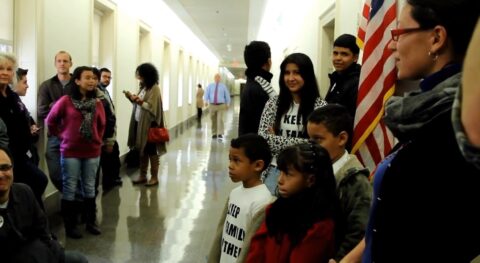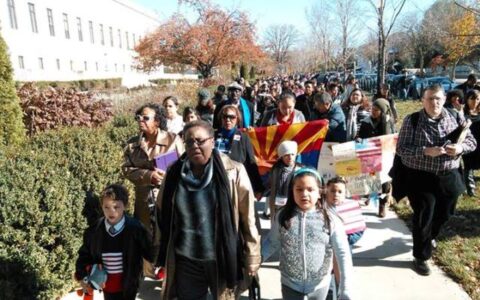Legislation

From the Mouths of Babes: Children Demand Immigration Reform
Families across the U.S. are facing the holidays separated from mothers, fathers, and siblings due to deportations and years-long waits for visas. Children—some of whose parents are undocumented immigrants—have taken to the halls of Congress this week to go to congressional offices, meet with members, and ask them to support immigration reform so that their families won’t be separated. Read More

‘Fast 4 Families’ Moves to Next Phase as New Fasters Take the Mantle
On the National Mall today, the four core fasters leading the “Fast 4 Families” ordained new fasters and ended their 22-day, water-only fast. Members of Congress, the faith community and civil and immigrant rights groups turned out to witness the four fasters passing the baton over to others who will continue the fast until House Speaker John Boehner schedules a vote on immigration reform. Read More

Will New USCIS Memos Confuse House Judiciary Committee Again?
One of the significant lessons of 2013 is that good immigration policy matters to the American public. It’s unfortunate, then, that the House Judiciary Committee is choosing to end its year focusing not on immigration reform, but on how best to take the President to task for making use of executive authority. Read More

Talking Turkey on Immigration 2013
In an effort to preserve harmony at the Thanksgiving table, we have for the last several years offered up tips on making the case for immigration reform in front of, what is for many, the most hostile audience of all—their families. Even in the most congenial of families, there’s likely to be someone who can push your buttons on the immigration issue. But you can, and should, engage them, armed with this year’s advice on talking turkey about immigration reform. Read More

House Inaction Escalates Community’s Demands for Immigration Reform
House Speaker John Boehner (R-OH) reassured a few die-hard anti-immigration reform activists when he said he would never agree to a conference to reach agreement on a House immigration bill and the Senate’s bipartisan immigration that passed in June. But his comments fired up those who want to see Congress improve the nation’s broken immigration system. Despite some in the House dragging their feet on considering immigration reform legislation—House Majority Whip Kevin McCarthy told advocates last week there weren’t enough days for them to act on it this year—immigration advocates in Washington, D.C., and across the country continued to push for the House to act on immigration reform. Read More

Remembering the Contributions of Immigrant Soldiers this Veterans Day
Immigrants fill every imaginable role in U.S. society. They are found in every profession, from farmworker to brain surgeon. They are the owners of small neighborhood bodegas and the C.E.O.s of high-tech transnational corporations. They represent their communities in town councils and in the U.S. Congress. And, not surprisingly, they are also found throughout the ranks of the U.S. military, fighting on the front lines and shaping policy in the Pentagon. The importance of the myriad roles that immigrants play in the armed forces has only increased since 9/11. In recognition of their service, tens of thousands of foreign-born military men and women have been offered, and taken, an expedited path to U.S. citizenship. These two decisions—to join the U.S. military and to become U.S. citizens—are perhaps the most powerful signs of full-fledged integration into the social fabric of the United States. Read More

How Immigrants on a Pathway to Citizenship can Revitalize Rust Belt Cities
Like Rust Belt cities such as Baltimore and Detroit, rural towns across America have experienced population declines in recent decades. Some places, however, are an exception to that trend thanks in part to the arrival of immigrants. For example, while other Iowa towns experienced population decline over the past several decades, West Liberty’s population grew because of immigration. As Steve Hanson, superintendent of West Liberty Community School District, notes, “in the last 20-30 years we would have had a population decline if we hadn’t had immigrants come in [for] jobs in the food manufacturing business. They provide a source of labor that wouldn’t have been there.” And West Liberty’s Mayor, Chad Thomas, said immigration has “kept a lot of storefronts and businesses open that probably otherwise would have closed.” Read More

Latino Voters Poised to Again Play Key Role in Elections
One year after the 2012 elections, in which the Latino vote played a pivotal role in the re-election of President Obama, the Republican Party is still attempting to figure out how to attract Latinos and new immigrant voters to the fold. Tomorrow, voters head to the polls to decide several state elections and the gubernatorial races in New Jersey and Virginia, and it looks like how a politician talks about immigration will continue to be a litmus test for Latino and Asian voters—many of whom see immigration as a personal issue. Consequently, the contrast between the Virginia and New Jersey races couldn’t be more telling. Read More

How Would Immigration Reform Help the U.S. Economy?
A growing consensus has emerged among both liberals and conservatives that immigration reform would serve as a stimulus to the U.S. economy. Reform would not only raise the wages—and therefore the tax payments and consumer purchasing power—of newly legalized immigrants, but would ensure future flows of immigrant workers, taxpayers, and consumers that are sufficient to meet the labor-force needs of our rapidly aging society. Conversely, trying to enforce our way out of a dysfunctional immigration system only wastes taxpayer dollars while exacting a high toll in both human lives and missed economic opportunities. Read More

Rumors of Immigration Reform’s Death Have Been Greatly Exaggerated, Again
The rumors of immigration reforms’ death have been greatly exaggerated over the years. In only the past few months, we’ve seen headlines like “Immigration Reform Heads for a Slow Death,” “Immigration Reform is Probably Dead,” and “RIP: Immigration Reform Bill is Dead.” Everyone wants to be the first to call it, the first to declare it, or the first person to have seen it coming. It’s not a terribly difficult story to write; some legislator or group of legislators say they don’t know how to get it done yet, or that it’s a hard issue to tackle, and presto, the stories come rolling out about the demise of reform. It may make a sexy headline, but for those who follow, understand and care about reform, these headlines become meaningless. In large part, because as soon as another legislator says or does something (like this week’s addition of three Republican members of Congress to the house immigration bill, H.R. 15) the headline quickly changes to “Immigration Reform Isn’t Dead Yet” and “Immigration Reform is Dead. Or Maybe it Isn’t.” Read More
Make a contribution
Make a direct impact on the lives of immigrants.
